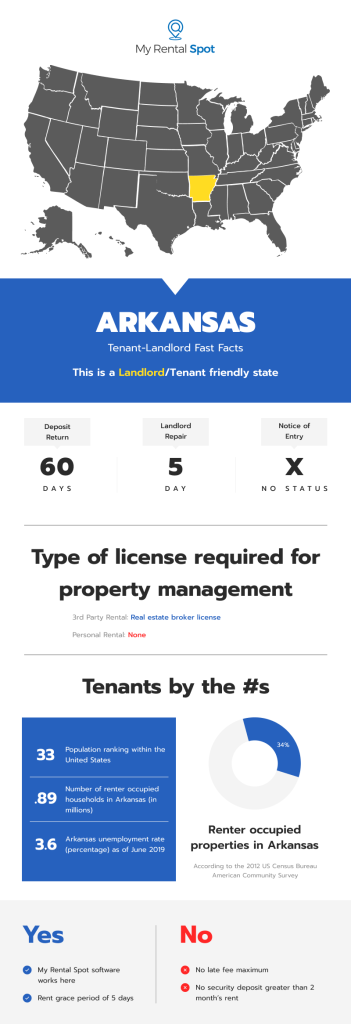Landlords and tenants will face legal issues during the rental process, but not every issue needs to involve the courts. This article will help you learn how the laws in your state handle everything from security deposits to termination notices so you can navigate these with ease.
This article is not intended to be exhaustive or a substitute for qualified legal advice. Laws and statutes are subject to change and may vary by county or city. You are responsible for performing your research and complying with all laws applicable to your unique situation.
If you have legal questions or concerns, we recommend consulting with the appropriate government agencies and a qualified lawyer in your area. Your state bar association may have a referral service to help you find a lawyer with experience in landlord-tenant law.

Official Rules and Regulations
- A.C.A. § 18-16 – Landlord and Tenant
- A.C.A. § 18-17 Arkansas Residential Landlord — Tenant Act of 2007
- The Arkansas LANDLORD/TENANT HANDBOOK (PDF)
- Guide: What You Should Know About Landlord and Tenant Rights
Details
Security Deposit:
- Exceptions: These security deposit statutes do not apply to landlords who own five (5) or fewer dwelling units, among other exceptions. (A.C.A. § 18-16-303)
- Security Deposit Maximum: Two (2) months rent (A.C.A. § 18-16-304)
- Security Deposit Interest: No Statute
- Separate Security Deposit Bank Account: No Statute
- Nonrefundable Deposits: No Statute
- Pet Deposits and Additional Fees: No statute, but the total deposit cannot exceed two (2) months of rent (A.C.A. § 18-16-304)
- Deadline for Returning Security Deposit: 60 days (A.C.A. § 18-16-305)
- Permitted Uses of the Security Deposit: Landlords can deduct portions, or all, of the security deposit to pay unpaid rent or for any damages, beyond normal wear and tear, due to the tenant’s noncompliance with the rental agreement. (A.C.A §18-16-305(2))
- Security Deposit Can Be Withheld: Yes. (A.C.A. § 18-16-305)
- Require Written Description/Itemized List of Damages and Charges: Yes (A.C.A. § 18-16-305)
- Receipt of Security Deposit: No Statute
- Record Keeping of Deposit Withholdings: No Statute
- Failure to Comply: If the landlord fails to return the security deposit within the statutory window, the tenant can recover any property and money due to him/her, damages up to twice the amount owed, attorney’s fees, and other reasonable costs. (A.C.A. §18-16-306)
Lease, Rent, and Fees:
- Rent Is Due: Rent is payable without demand or notice at the time and place agreed upon by the parties. Unless otherwise specified in writing, rent is payable at the dwelling unit. Periodic rent is payable at the beginning of any term of one (1) month or less, and otherwise in equal monthly installments at the beginning of each month. (A.C.A. § 18-17-401)
- Payment methods: No statute.
- Rent Increase Notice: No statute.
- Rent Grace Period: Five days (A.C.A. § 18-17-701(b))
- Late Fees: No statute.
- Application fees: No statute.
- Prepaid Rent: No statute.
- Returned Check Fees: Not to exceed $10-$50, depending on the reason. (A.C.A. § 5-37-307 and A.C.A. § 5-37-304)
- Tenant Allowed to Withhold Rent for Failure to Provide Essential Services (Water, Heat, etc.): No statute.
- Tenant Allowed to Repair and Deduct Rent: No statute.
- Self-Help Evictions: No statute. The courts will decide damages on a case-by-case basis.
- Landlord Allowed to Recover Court and Attorney Fees: Yes (A.C.A. § 18-17-701(2) and A.C.A. § 18-17-704)
- The Landlord Must Make a Reasonable Attempt to Mitigate Damages, including an Attempt to Rerent: No statute.
Notices and Entry:
- Notice to Terminate Tenancy – Fixed End Date in Lease: No statute. Typically, no notice is needed since the lease simply expires.
- Notice to Terminate Tenancy – Month-to-Month Lease: Written notice of 30 days from either the landlord or the tenant (A.C.A. § 18-17-704(b))
- Notice to Terminate Tenancy – Week-to-Week Lease: 7 days written notice from either the landlord or the tenant (A.C.A. § 18-17-704(a))
- Termination for Nonpayment of Rent: Five days unconditional quit notice, and the landlord must wait the full five days to start the eviction process. (A.C.A. § 18-17-701(b), A.C.A. § 18-16-101, A.C.A. § 18-17-901(b))
- Termination for Lease Violation: The landlord must deliver a written notice specifying the violations. If the tenant does not remedy the violations, the lease agreement terminates within 14 days of the notice’s delivery. (A.C.A. § 18-60-701(a)(1)) The landlord may terminate the agreement immediately under a variety of conditions (A.C.A. § 18-60-304)
- Required Notice before Entry: State law states that tenants cannot “unreasonably withhold consent” of the landlord entering the rental unit. (A.C.A. § 18-17-602)
- Entry Allowed with Notice for Maintenance and Repairs (non-emergency): Yes (A.C.A. § 18-17-602)
- Entry Allowed with Notice for Showings: Yes (A.C.A. § 18-17-602)
- Emergency Entry Allowed without Notice: No statute.
- Notice of Date/Time of Move-Out Inspection: No statute.
- Notice of Extended Absence: No statute.
- Entry Allowed During Tenant’s Extended Absence: No statute.
- Notice to Tenants for Pesticide Use: No Statute
- Lockouts Allowed: No statute.
- Utility Shut-offs Allowed: No statute, but these are never allowed.
- Abandonment of Personal Property: Upon the voluntary or involuntary termination of any lease agreement, all personal property left behind by the tenant can be disposed of by the landlord without recourse by the tenant. (A.C.A. § 18-16-108)
Disclosures and Miscellaneous Notes:
- Tenant’s Duties: (A.C.A. § 18-17-601)
- Compliance: Comply with all obligations imposed upon tenants by provisions of building and housing codes that affect health and safety;
- Cleanliness: Keep that part of the premises that the tenant occupies and uses as clean and safe as the condition of the premises permits;
- Trash: Dispose of all ashes, garbage, rubbish, and other waste in a clean and safe manner;
- Plumbing: Keep all plumbing fixtures in the dwelling unit or that the tenant uses as clean as their condition permits;
- Appliances: Use in a reasonable manner all electrical, plumbing, sanitary, heating, ventilating, air-conditioning, and other utilities and appliances including elevators in the premises;
- Lawful Activity: Not deliberately or negligently destroy, deface, damage, impair or remove any part of the premises, or knowingly permit any person to do so; and
- Quiet Enjoyment: Conduct himself and require other persons on the premises with his consent to conduct themselves in a manner that will not disturb his neighbors’ peaceful enjoyment of the premises.
- Domestic Violence Situations: (A.C.A. § 18-16-112)
- Proof of Status: Landlord is entitled to verify a tenant’s claim of domestic violence status. (A.C.A. § 18-16-112(d))
- Protection from Termination: The landlord cannot terminate a tenancy, fail to renew a tenancy, or refuse to enter into a rental agreement with a victim of domestic violence. (A.C.A. § 18-16-112(b))
- Locks: Upon request, the landlord must change or rekey the locks at the tenant’s expense. (A.C.A. § 18-16-112(b))
- Retaliation: After receiving notice of the presence of lead hazards, no owner of any dwelling or dwelling unit shall engage in retaliatory action against a tenant, especially as it pertains to eviction or threat of eviction due to the presence of lead hazards. (A.C.A. § 20-27-608)
- Lead Disclosure: Landlords must disclose all known lead paint hazards. Landlords must also provide tenants, as an attachment to a written lease, with an information pamphlet on lead-based paint hazards.
Court and Legal Related:
- Arkansas Small Claims Court
- Limit: $5,000
- Eviction Cases Allowed in Small Claims: No
- Guide to Small Claims Court in Arkansas (PDF)
- Guide to Small Claims Court in Arkansas (web version)
- Statute of Limitations
- Written Contracts: 5 years (A.C.A. § 16-56-111)
- Arkansas Judiciary
- Arkansas Attorney General
- Arkansas District Courts
- Arkansas Bar Association
- Legal Aid:
Business Licenses:
- Business License: No statewide statute, but local cities and counties may have regulations and requirements. Check with your local governing authority.
Helpful Links
- Report: Non-Legislative Commission on the Study of Landlord-Tenant Laws (PDF)
- Review: A Tenant’s Dilemma: The Arkansas Residential Landlord-Tenant Act of 2007 (PDF)
State Agencies & Regulatory Bodies
- U.S. Department of Housing and Urban Development – Arkansas – Rental Help
- Arkansas Fair Housing Commission
- Arkansas Department of Insurance
- Arkansas Consumer Protection Division
- U.S. Department of Housing and Urban Development – Arkansas – Rental Help
- Arkansas Real Estate Commission
- Arkansas Health Department
Housing Authorities
- U.S. Department of Housing and Urban Development–HUD
- Fayetteville Housing Authority
- Fort Smith Housing Authority
- Hot Springs Housing Authority
- Metropolitan Housing Alliance
- North Little Rock Housing Authority
- Springdale Housing Authority
Realtor, Landlord, and Tenant Associations
- Arkansas Multi-Family Housing Association
- Arkansas Apartment Association
- Affordable Housing Associations of Arkansas
- Northwest Arkansas Apartment Association
REALTORS® Associations
- Arkansas REALTORS® Association
- Little Rock Association of REALTORS®
- Fort Smith Association of REALTORS®
- Northwest Arkansas Board of REALTORS®
- Metro Area Board of REALTORS®
Landlord Associations
- Landlords Association of Arkansas
- Northeast Arkansas Landlord Association
- North Little Rock Landlords Association
- South Arkansas Landlords Association
- Faulkner County Landlords Association
- Hot Springs Landlords Association
- River Valley Landlords Association
